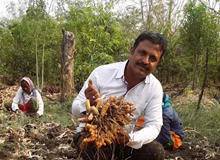
Organic products are attracting health-conscious consumers very much. Sikkim is the only state in India that is completely producing organic. The pulses, Rice, and the other fruits and vegetables if grown organically, then the right price is assured. For the export of these the import, the country is also asking organic produce.
Apart from the pulses, rice, and fruits and vegetables, the protein-rich mushrooms are also catching the importance. A mix of sawdust with corn cobs, kelp meal, and various brans provides the perfect substrate for growing specialty organic mushrooms.
Mushrooms are a culinary treat, and many contain beneficial vitamins and nutrients like vitamin D, vitamin B, selenium, antioxidants, and iron. Purchasing mushrooms can weigh on your budget, though, and harvesting wild mushrooms often prove to be a hazardous venture. To save yourself money and peace of mind, you can grow organic mushrooms that offer you all the benefits of mushrooms with few of the risks.
In nature, mushrooms grow naturally on dead wood so it only makes sense to use this type of technology commonly practiced by Asian growers overseas," says Robin Park with Enviro Mushrooms. Sawdust (and other components) make for some tasty specialty mushrooms.
Do they taste better this way? Park thinks so. “Sawdust is (basically) dead wood,” he says. Enviro Mushrooms uses sawdust brought in from Quebec, British Columbia and within Ontario. It’s mixed with the other components and mixed three times a week, then sits for a whole year to compost naturally before it can be used. “It provides a more similar environment to where mushrooms actually come from so the taste is much better,” he says.
The 365-day a year facility produces king oysters, Enoki, black oysters, white oysters, and regular oysters for foodservice, retail and wholesale for its customer base in the eastern part of North America. About 20,000 lbs. of king oysters are grown per week and about 8,000 lbs. of black oyster mushrooms, says Park and overall they produce about 3.5 million lbs. of mushrooms a year in the 200,000 sq. ft. facility.
After four years at its original building, deadwood, the company built a larger facility to compete with the bigger growers. Park says there is some competition in Canada but not many growers are involved in specialty varieties in eastern Canada; it’s the imports that present the most competition, he says. “We do a lot of demo cooking at stores." Because these are already highly consumed by the Asian community, it’s the western market they’re targeting more.
Western demand is growing. “Our western market used to only be 14 percent at the beginning and now it’s up to 35 percent,” he says. “We’re running a more hostile marketing strategy where we target more Loblaws stores and food delivery services (subscription boxes) where customers can try our mushrooms directly.”











